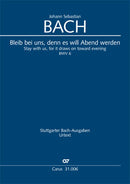| 作曲者 | Johann Sebastian Bach (1685-1750)・ヨハン・セバスティアン・バッハ |
| タイトル | Bleib bei uns, denn es will Abend werden, BWV 6 (Score) |
| サブタイトル | Easter Monday |
| 出版社 | Carus・カールス |
| 楽器編成 | 混声合唱 |
| 楽器編成(詳細) | Soli SATB,Coro SATB,2 Ob,Obca (Viola),2 Violins,Viola,Cellopic,Basso continuo |
| 品番 | M007041687 |
| 校訂者 | Reinhold Kubik |
| 難易度 | 中級 |
| 言語 | ドイツ語・英語 |
| 形状 | 64 ページ・21 x 29.7 cm・218 g・ソフトカバー |
| 演奏時間 | 26分 |
| 作曲年 | 1725年 |
| 出版年 | 1981年 |
| 出版番号 | CV 31.006/00 |
| ISMN | 979-0-007-04168-7 |
| サンプル | https://www.carusmedia.com/images-intern/medien/30/3100600/3100600x.pdf |
Bach composed the cantata “Stay with us, for it draws on toward evening” BWV 6 for Easter Monday 1725. In fact, it is certain that a chorale cantata had been planned for that feast day, but for some unknown reason, the annual cycle of chorale cantatas broke off just before Easter 1725. For BWV 6, Bach fell back on a text by an author whose texts he had already set numerous times in his first Leipzig annual cycle of cantatas (which are conspicuous by their ever constant structure and use of two chorale settings). From the gospel for Easter Monday, the story of the Emmaus disciples, only the disappearing daylight and the fear of being left alone are made the subject of discussion. A truly magnificent choral movement opens the cantata. The first chorale for soprano and violoncello piccolo, which Bach later included in his “Schübler-Choräle, ” is also well-known outside of the cantata.



